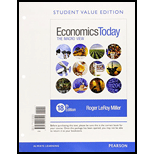
The objectives, functions and policy issues of the World Bank and IMF
Concept introduction:
World Bank − The multilateral institution was created in 1944 as the International Bank for Reconstruction and Development (IBRD) as the development bank to reconstruct the World War II damaged European Economies. It is presently headquartered at Washington along with its twin sister IMF headquarters. Presently, the World Bank consists of two organizations-
- The International Bank for Reconstruction and Development (IBRD)- To develop the middle-income and creditworthy low-income countries to bolster their
economic growth and development. - The International Development Association (IDA) - To provide credits and grants to the poorest countries. These credits/grants are the interest free loans to provide financial aid to these countries.
International Monetary Fund (IMF) − It is the twin sister multilateral institution of the World Bank with its origin dating back to 1930s, while its structure and operational formalization was done in 1944 along with IBRD. To correct the international chaos triggered by the Second World War, it provides regulatory, financial and consultative functions. These include credit grants to correct the BoP deficits, surveillance over the monetary and exchange rate polices of the member countries for mutual gain and development. It works towards the establishment of the multilateral system of payments and alleviate the disequilibrium in the international balance of payments. Overall it aims at balanced growth across the member countries to increase employment, real income and optimal utilization of the productive resources across the globe.
Financial Intermediation- The productive economic activity in the financial market whereby an institutional unit engages in financial transactions in the market to acquire financial assets and in the process incurs liabilities in its own account. Transaction costs and economies of large scale, asymmetric information types like adverse selection (hidden information) and Moral Hazard (hidden action) are the rationales of financial intermediation.
Want to see the full answer?
Check out a sample textbook solution
Chapter 18 Solutions
Economics Today: The Macro View, Student Value Edition Plus MyLab Economics with Pearson eText --Access Card Package (18th Edition)
- how commond economies relate to principle Of Economics ?arrow_forwardCritically analyse the five (5) characteristics of Ubuntu and provide examples of how they apply to the National Health Insurance (NHI) in South Africa.arrow_forwardCritically analyse the five (5) characteristics of Ubuntu and provide examples of how they apply to the National Health Insurance (NHI) in South Africa.arrow_forward
- Outline the nine (9) consumer rights as specified in the Consumer Rights Act in South Africa.arrow_forwardIn what ways could you show the attractiveness of Philippines in the form of videos/campaigns to foreign investors? Cite 10 examples.arrow_forwardExplain the following terms and provide an example for each term: • Corruption • Fraud • Briberyarrow_forward
- In what ways could you show the attractiveness of a country in the form of videos/campaigns?arrow_forwardWith the VBS scenario in mind, debate with your own words the view that stakeholders are the primary reason why business ethics must be implemented.arrow_forwardThe unethical decisions taken by the VBS management affected the lives of many of their clients who trusted their business and services You are appointed as an ethics officer at Tyme Bank. Advise the management regarding the role of legislation in South Africa in providing the legal framework for business operations.arrow_forward

 Principles of Economics (12th Edition)EconomicsISBN:9780134078779Author:Karl E. Case, Ray C. Fair, Sharon E. OsterPublisher:PEARSON
Principles of Economics (12th Edition)EconomicsISBN:9780134078779Author:Karl E. Case, Ray C. Fair, Sharon E. OsterPublisher:PEARSON Engineering Economy (17th Edition)EconomicsISBN:9780134870069Author:William G. Sullivan, Elin M. Wicks, C. Patrick KoellingPublisher:PEARSON
Engineering Economy (17th Edition)EconomicsISBN:9780134870069Author:William G. Sullivan, Elin M. Wicks, C. Patrick KoellingPublisher:PEARSON Principles of Economics (MindTap Course List)EconomicsISBN:9781305585126Author:N. Gregory MankiwPublisher:Cengage Learning
Principles of Economics (MindTap Course List)EconomicsISBN:9781305585126Author:N. Gregory MankiwPublisher:Cengage Learning Managerial Economics: A Problem Solving ApproachEconomicsISBN:9781337106665Author:Luke M. Froeb, Brian T. McCann, Michael R. Ward, Mike ShorPublisher:Cengage Learning
Managerial Economics: A Problem Solving ApproachEconomicsISBN:9781337106665Author:Luke M. Froeb, Brian T. McCann, Michael R. Ward, Mike ShorPublisher:Cengage Learning Managerial Economics & Business Strategy (Mcgraw-...EconomicsISBN:9781259290619Author:Michael Baye, Jeff PrincePublisher:McGraw-Hill Education
Managerial Economics & Business Strategy (Mcgraw-...EconomicsISBN:9781259290619Author:Michael Baye, Jeff PrincePublisher:McGraw-Hill Education





